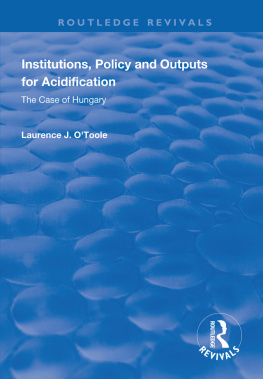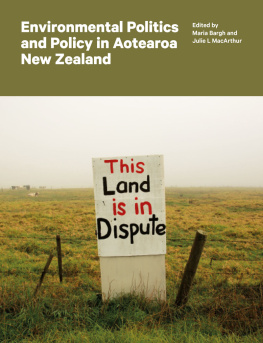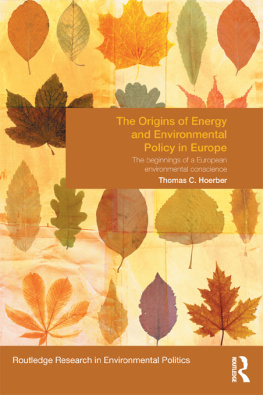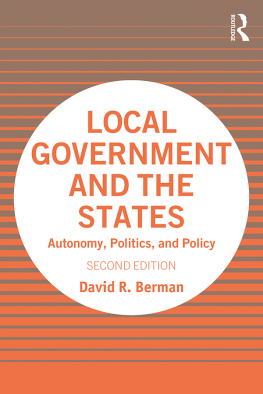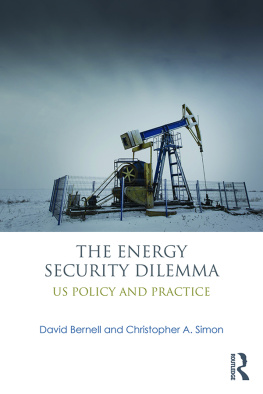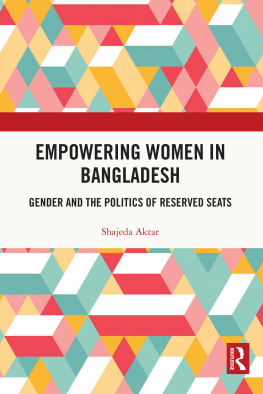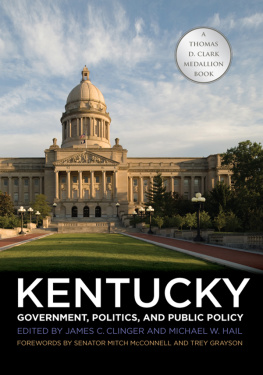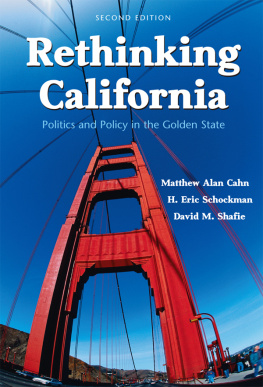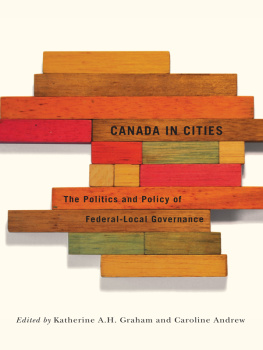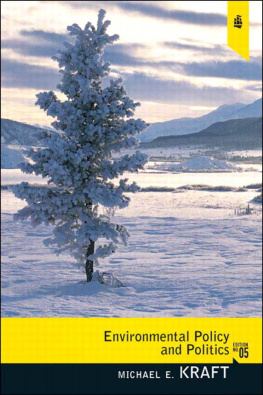Big Oil in the United States
Industry Influence on Institutions, Policy, and Politics
Jerry A. McBeath

Copyright 2016 by Jerry A. McBeath
All rights reserved. No part of this publication may be reproduced, stored in a retrieval system, or transmitted, in any form or by any means, electronic, mechanical, photocopying, recording, or otherwise, except for the inclusion of brief quotations in a review, without prior permission in writing from the publisher.
Library of Congress Cataloging-in-Publication Data
Names: McBeath, Gerald A., author.
Title: Big oil in the United States : industry influence on institutions, policy, and politics / Jerry A. McBeath.
Description: Santa Barbara, California : Praeger, [2016] | Includes bibliographical references and index.
Identifiers: LCCN 2016005285 | ISBN 9781440837425 (hard copy : alk. paper) | ISBN 9781440837432 (ebook)
Subjects: LCSH: Petroleum industry and tradePolitical aspectsUnited States. | Gas industryPolitical aspectsUnited States. | Business and politicsUnited States. | Big businessPolitical aspectsUnited States.
Classification: LCC HD9566 .M397 2016 | DDC 338.2/7280973dc23
LC record available at http://lccn.loc.gov/2016005285
ISBN: 978-1-4408-3742-5
EISBN: 978-1-4408-3743-2
20 19 18 17 16 1 2 3 4 5
This book is also available as an eBook.
Praeger
An Imprint of ABC-CLIO, LLC
ABC-CLIO, LLC
130 Cremona Drive, P.O. Box 1911
Santa Barbara, California 93116-1911
www.abc-clio.com
This book is printed on acid-free paper 
Manufactured in the United States of America
For Jenifer, Bowen, and Rowena
Contents
Acknowledgments
In April 2014, Jessica Gribble, Praegers acquisitions editor, asked if I might be interested in writing a book on the topic of big oil in the United States. Set to retire in a few months after 44 years of college teaching, I thought a large research/writing project would be a nice transition. Although Id done research on Alaska oil and gas issues since 1980, there was much to learn about the other oil- and gas-producing states and national energy policy, so I viewed Jessicas proposition as a welcome challenge.
Many helped me find good sources of information and the right people to talk to in the next year and a half. Because for 30 some years Id participated in the annual states budget roundtable at the Western Political Science Association, thats where I turned first. Helping me develop contacts in California were John Korey (emeritus professor, California State Polytechnic University, Pomona), Ted Lascher (professor of public policy and administration, Cal State University, Sacramento), and James Goldstene (previously the executive officer of the California Air Resources Board). In Colorado, Tom Cronin (president emeritus, Whitman College, and professor of American institutions and leadership at Colorado College) and Bruce Finley (writer for the Denver Post ) shared their contacts and insights. In Wyoming, Bob Schuhman (professor of public administration, state/local government and associate dean) introduced me to colleagues in economics and energy. Robert Godby, associate professor, and Ben Cook, visiting assistant professor, both in economics and finance at the business school put me in touch with several oil and gas regulators. Two professors at the University of New Mexico School of Law, Denise Fort and Alex Ritchie, facilitated my finding good respondents in their state.
Law professors in other states were equally gracious. At the University of Houston Law School, Jacqueline Weaver and Tracy Hester introduced me to members of their faculty who had extensive experience in the oil/gas industry and in government, including stints with the Texas Railroad Commission and the Texas Commission on Environmental Quality. Owen Anderson of the Oklahoma University College of Law provided an entre to his states Corporation Commission. David Saxowsky (associate professor of agricultural economics with an affiliation at the school of law) seemed to know all the players in the North Dakota Industrial Commission. Finally John Callahan, public information officer of the Bureau of Ocean Energy Management (BOEM), and Maureen Clark, public affairs specialist at the Bureau of Land Management (BLM), both in Alaska, alerted me to national officials and those in other states who were knowledgeable about the issues I was studying.
The people I met and interviewed were generous with their time; they often referred me to others I should talk to. Ive appended a list of respondents and this mention is small thanks for the large contributions these respondents made to the study.
Several former colleagues and friends kindly reviewed draft chapters of the manuscript: Tom Morehouse and Carl Shepro (both professors of political science emeritus, University of Alaska Anchorage) and Jim Gladden (professor of political science emeritus, University of Alaska Fairbanks [UAF]). My base in Alaska supported the research in several ways. Professor Todd Sherman, Dean of the College of Liberal Arts (UAF), arranged for office space. UAF Summer Sessions provided a travel grant for one of my research trips. Breehan Yauney in the Deans office and Laura Schneider, administrative assistant in history and northern studies, taught me how to deal with errant program files and word processing glitches. Kacy Roach aided in the preparation of the bibliography.
From the start of the research to the final corrections of the manuscript, Jessica Gribble was an attentive and highly positive editor. She satisfied the need of authors to know that every attempt to improve the manuscript is requited. Also at Praeger, I thank Robin Tutt in editorial operations and Elana Palace, the editorial assistant. Both Michelle Scott and Uma Maheswari in production were immensely helpful in answering my questions and in dealing deftly with my prose.
Unlike the other research projects of my career, this one was a family affair. My wife Jenifer (a plant pathology/biotechnology professor at UAF) took phone messages, provided advice in tracking down difficult-to-reach respondents, and urged me to find interesting stories to tell in the book. My son Bowen (professor of social work and public administration at Portland State University) commented constructively on each chapter and rooted out lapses in logic (and facts). My daughter Rowena (an orthopedic surgeon at the Philadelphia Hand Center) opened her home for my research on the Pennsylvania case study. Even my granddaughter Cora assisted by redrawing the maps.
My heartfelt thanks go to all who assisted this project. For any remaining errors and omissions, I alone am responsible.
Introduction
WHAT INFLUENCE DOES THE OIL AND GAS INDUSTRY HAVE IN U.S. POLITICS AND WHY?
This is the thesis we pursue throughout the book. At the outset, we describe what the oil and gas sector contributes to the United Statesto the economy, to national security, and to political stability. The history of oil, from Drakes 1859 discovery of oil in Pennsylvania to the present (2016), and increases in production through technological innovation are treated as well. Definitions clarify the size and power of the oil and gas drivers.
This study differs from most other volumes on the energy sector because it looks at oil and gas development through the lens of the complex regulatory regime, and we discuss this in a special section, using laymans terms. We then introduce the study conducted to collect data, including original qualitative research and standard social science investigation into existing sources of literature. The next section previews the six substantive chapters and unwraps the argument. In a final note, we consider the unusual context during which the study was done: sharp drops in both oil and gas prices from late 2014 through 2015.
Next page

